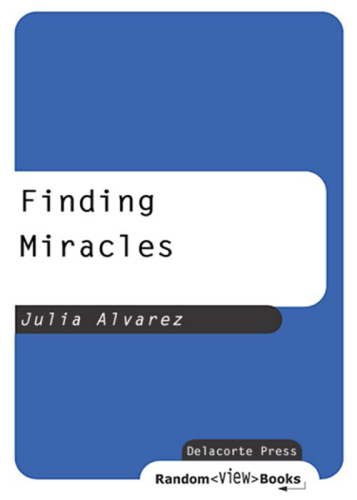
Finding Miracles
فرمت کتاب
ebook
تاریخ انتشار
2007
Lexile Score
770
Reading Level
3-4
ATOS
4.9
Interest Level
6-12(MG+)
نویسنده
Julia Alvarezشابک
9780307433336
کتاب های مرتبط
- اطلاعات
- نقد و بررسی
- دیدگاه کاربران
نقد و بررسی

November 29, 2004
Milly Milagros Kaufman has two names and two identities. She is "Milly," a fairly normal ninth grader, who has lived in Vermont for most of her life with her adoptive parents, sister and younger brother. She is also "Milagros," the abandoned orphan who was rescued from a troubled (unnamed) Latin American country by two Peace Corps volunteers when she was a baby. Self-conscious about being adopted, Milly avoids discussing or even thinking about her past, until she meets Pablo, a refugee who comes from the same politically unstable country where Milly was born. As Milly listens to Pablo's stories of home, her curiosity is piqued along with a long-repressed desire to connect with her birthplace, and when the opportunity comes for her to visit it (with Pablo and his family), Milly jumps at the chance. In this tender tale, Alvarez (Before We Were Free
) traces Milly's discovery of herself and a country that is at once beautiful and terrible. Despite the fact that Milly does not find answers to all of her questions, she does find acceptance and new purpose during her journey. The circumstances of Milly's trip and her relationship with Pablo feel somewhat contrived, yet her internal growth and changing attitudes progress authentically. Ages 12-up.

October 1, 2004
Gr 6-9 -In spite of her family's openness, Milly Kaufman has never wanted to talk about her adoption. However, during ninth grade, Pablo Bolvar, a refugee from an unnamed Central American country, joins her class and immediately identifies her as someone who might have come from his family's hometown. Then, her grandmother attempts to make a will that differentiates between her and her siblings. While her mother and father's angry reaction makes the woman back down, their increasingly close relationship with Pablo's family makes it impossible for Milly to stop thinking about the parents who gave her up and the war-torn nation she came from. When that country's dictator is deposed in a democratic election, the Bolvars go home to visit and invite Milly along. There she discovers a world quite different from her Vermont home, an extended family, a boyfriend in Pablo, and several possible sets of birth parents. She realizes, too, how much she loves her own family, and they join her for a grand reunion. The strength of this book lies in its description of adoption issues-Milly's feelings of abandonment and difference and her sister's fear that Milly's increased identification as Latina will destroy their close relationship. However, the plot is contrived to help Milly find her identity, and the characters never really come alive. The home country has been stripped of any identifying characteristics that might make the setting interesting. Still, readers interested in this subject will be pleased with the satisfying resolution.-Kathleen Isaacs, Edmund Burke School, Washington, DC
Copyright 2004 School Library Journal, LLC Used with permission.

October 15, 2004
Gr. 8-11. Alvarez returns to a familiar theme--the effect of a dictatorship on the citizens of a Latin American country--but half of this story is set in Vermont, where 16-year-old Milly Kaufman tries to come to terms with her adoption as a child from a never-named country. When new student Pablo arrives from their native land, Milly tries to ignore him, but she needs to know her history, so she returns for a visit with Pablo and his family. In some ways this is a blend of fairy tale and horror story. Pablo realizes Milly is from his country because of her unique eyes. Once in her homeland (the lack of the country's name is awkward and annoying), Milly returns to the region where people with her eyes live and finds the elderly woman who remembers all stories: Milly's parents were more than likely revolutionaries. The romantic personal voyage is mixed with the country's history of murders, rapes, and sadness. Alvarez was probably trying to make the personal universal here, but in many places this unwieldy and too long. Effective? Yes, sometimes--but not as much as it could have been.(Reprinted with permission of Booklist, copyright 2004, American Library Association.)

























دیدگاه کاربران